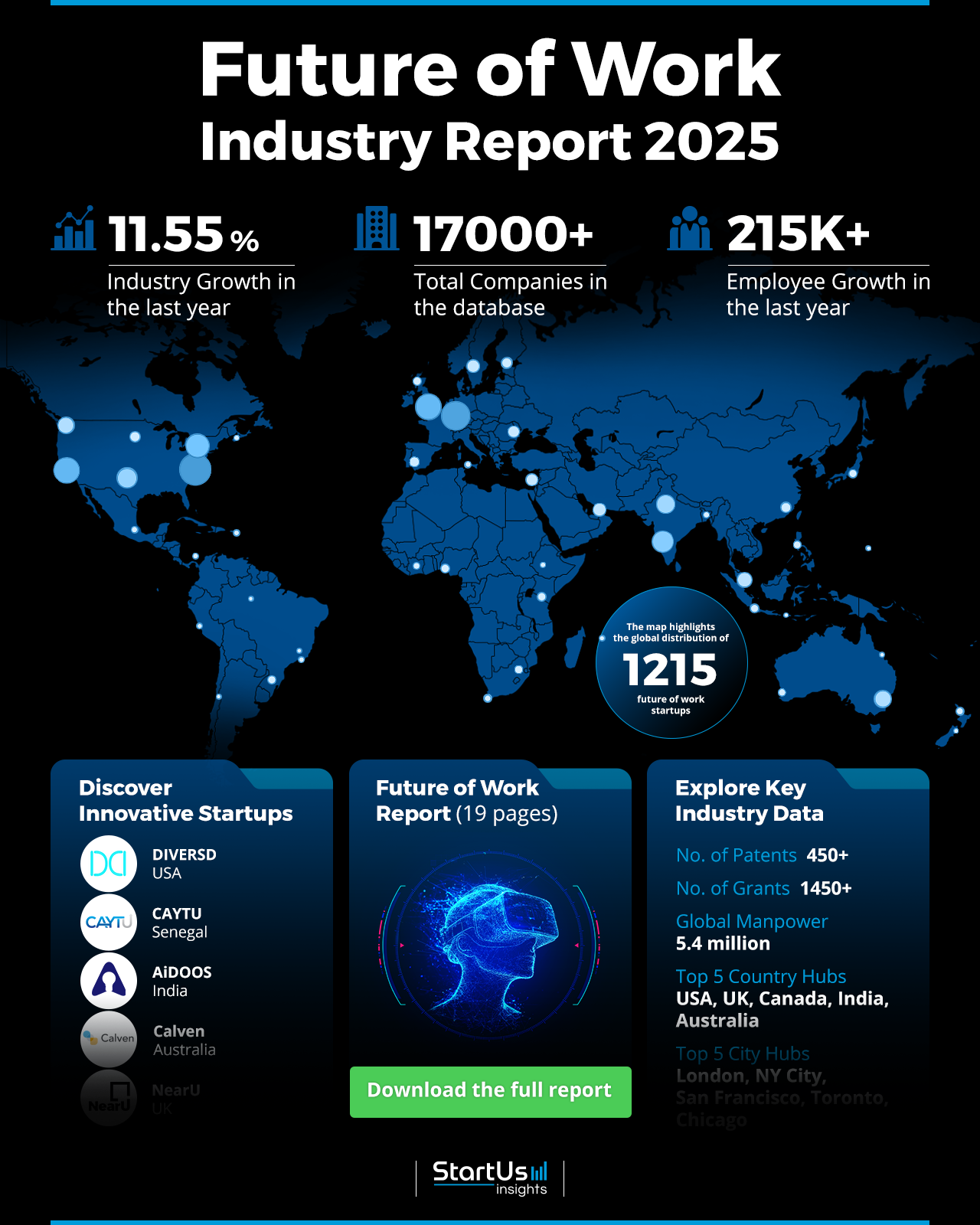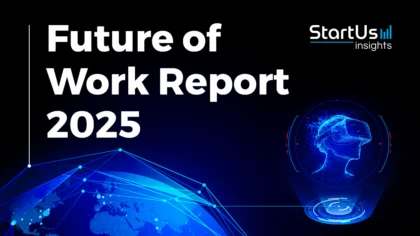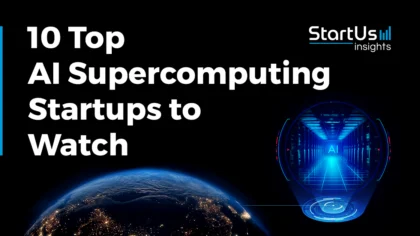Accelerate Productivity in 2025
Reignite Growth Despite the Global Slowdown
The 2025 Future of Work Report analyzes how technological, economic, and social shifts are reshaping work, workforce management, and workplace environments. The rapid advancements in AI, automation, and remote collaboration tools drive productivity, flexibility, and employee experience. Organizations are adopting hybrid work models and digital platforms to meet evolving employee expectations, enhance operational efficiency, and stay competitive. This report explores key trends, investment flows, and emerging startups to provide insights into how work environments, practices, and policies will evolve to meet modern workforce demands.
This report on the future of work serves as a reference for stakeholders within the industry, investors, policymakers, and economic analysts, providing a snapshot of the industry’s health to map its trajectory for innovation and growth in the coming years.
StartUs Insights Future of Work Report 2025
- Executive Summary
- Introduction to the Future of Work Report 2025
- What data is used in this Future of Work Report?
- Snapshot of the Global Future of Work Market
- Funding Landscape in the Future of Work
- Who is Investing in Future of Work Solutions?
- Emerging Trends in the Future of Work
- 5 Innovative Future of Work Startups

Executive Summary: Future of Work Report 2025
This report is created using data obtained from the Big Data and AI-powered StartUs Insights Discovery Platform, covering more than 4.7 million global companies, as well as 20K+ technologies and emerging trends. We also analyzed a sample of 1200+ future of works startups developing innovative solutions to present five examples from emerging future of work trends.
- Industry Growth Overview: The future of work market continues to expand with an 11.55% annual growth rate and over 17,000 companies. More than 1200 startups actively contribute to this evolving space.
- Manpower & Employment Growth: The market employs approximately 5.4 million people globally, with over 215,000 new employees added last year, indicating steady workforce expansion.
- Patents & Grants: Innovation is supported by over 450 patents registered by more than 240 applicants and 1,450 grants, underscoring a commitment to advancing work-related technologies.
- Global Footprint: Leading country hubs include the USA, UK, Canada, India, and Australia. Major city hubs are London, New York City, San Francisco, Toronto, and Chicago.
- Investment Landscape: Investment flows remain strong, with an average funding round value of USD 85.2 million. Over 11700 funding rounds were recorded, highlighting substantial investor interest.
- Top Investors: Leading investors such as IGM Financial, Barclays, Carlyle Group, and more have contributed over USD 9 billion in combined investment.
- Startup Ecosystem: Five innovative startups include DIVERSD (AI for Diversity, Equity, and Inclusion), CAYTU (Office Robots), AiDOOS (Web3 Decentralized Future of Work), Calven (Workplace Experience Platform), and NearU (On-demand Workspaces).
- Recommendations for Stakeholders: Investors should back technologies supporting remote collaboration, AI-driven productivity tools, and adaptive workforce solutions. Entrepreneurs must create flexible, scalable platforms that enhance employee engagement, well-being, and hybrid work capabilities. Companies should prioritize reskilling and upskilling programs, integrate digital tools for hybrid workflows, and promote an inclusive culture to attract diverse talent.
Explore the Data-driven Future of Work Report for 2025
The Future of Work Report 2025 uses data from the Discovery Platform and encapsulates the key metrics that underline the sector’s dynamic growth and innovation. Our database has over 17000 companies, with 1200+ startups actively contributing to this space. The domain experiences an annual growth rate of 11.55%.
These companies employ a global workforce of 5.4 million, with 215000 new employees added last year. Innovation is evident through 450+ registered patents and 1450+ grants. The top country hubs include the USA, UK, Canada, India, and Australia. Further, the most active cities in this domain are London, New York City, San Francisco, Toronto, and Chicago.
What data is used to create this future of work report?
Based on the data provided by our Discovery Platform, we observe that the future of work field ranks among the top 5% in the following categories relative to all 20K topics in our database. These categories provide a comprehensive overview of the industry’s key metrics and inform the short-term future direction of the industry.
- News Coverage & Publications: The future of work market received extensive media attention, with over 22000 publications covering developments in the past year.
- Funding Rounds: Our database records 11700+ funding rounds that showcase strong investment activity.
- Manpower: The market employs more than 5 million workers, adding over 215000 new employees last year.
- Patents: Innovation efforts are evident, with more than 450 patents registered.
- Grants: The organizations have secured 1450+ grants, supporting various projects and initiatives.
- Yearly Global Search Growth: The global interest in the market is growing, with yearly search volumes increasing by 29.48%.
A Snapshot of the Global Future of Work
The future of work market shows dynamic activity and steady growth. With an 11.55% annual growth rate, the ecosystem includes 1200+ startups, with over 950 in the early stages. It has witnessed over 860 mergers and acquisitions, which demonstrates consolidation and scaling efforts. In terms of intellectual property, more than 450 patents have been registered by 240+ applicants, with the United States leading with 170+ patents, followed by China with 75+. However, patent activity has slightly decreased, with a yearly growth rate of -2.62%.
Explore the Funding Landscape of the Future of Work Industry
The financial landscape reflects significant investment, with an average of USD 85.2 million raised per funding round. The market has a large network of more than 8700 investors and has successfully closed over 11700 funding rounds. More than 2800 companies in this space have received investments. This reinforces the sustained interest and capital inflow into the sector.
Who is Investing in Future of Work Solutions?
The top investors in the future of work field have invested over USD 9 billion, reflecting significant financial backing.
- IGM Financial invested USD 1.4 billion across 3 companies.
- Barclays allocated USD 1.3 billion to 7 companies.
- Carlyle Group supported 7 companies with investments totaling USD 1.2 billion.
- TPG invested USD 1.1 billion across 5 companies.
- Athyrium Capital Management placed USD 1.1 billion across 2 companies.
- RBC Capital Markets funded 5 companies with USD 832.1 million.
- Scotiabank invested USD 807.1 million across 3 companies.
- TA Associates allocated USD 800 million across 5 companies.
- Accel diversified with investments totaling USD 760 million across 14 companies.
- TD Securities committed USD 756.3 million to 5 companies.
Access Top Future of Work Innovations & Trends with the Discovery Platform
The future of work domain shows rapid transformation, with several emerging trends driving innovation and growth. Below are the top three trends and their firmographic data:
- Hybrid Work trend is widely adopted, with over 1500 companies involved in developing solutions. It employs more than 94K people, adding 8K new employees in the past year. The trend annual growth rate is 18.58%, which reflects strong interest in flexible working models. Hybrid work is reshaping how organizations structure operations and workforce engagement.
- AI Meeting Assistants are becoming essential tools for enhancing productivity through seamless meeting facilitation. This trend is growing rapidly, with over 90 companies involved. The workforce includes over 2K employees, with 900 new hires last year. The trend annual growth rate is 78.75%, driven by increasing demand for automation in workplace communication.
- Mental Health Services are becoming a central focus for organizations to support employee well-being in evolving work environments. This segment involves more than 25K companies, employing over 2 million people. The industry added 130K new employees last year. The trend annual growth rate of 8.20% indicates steady expansion.
5 Top Examples from 1200+ Innovative Future of Work Startups
The five innovative startups showcased below are picked based on data including the trend they operate within and their relevance, founding year, funding status, and more. Book a demo to find promising startups, emerging trends, or industry data specific to your company’s needs and objectives.
DIVERSD offers AI for Diversity, Equity, and Inclusion (DEI)
US startup DIVERSD develops a cultural engagement platform to unify HR processes, surveys, and goal-setting within organizations. It integrates various point solutions into an AI-supported interface to streamline activities like 360-degree reviews, employee resource group (ERG) management, and DEI initiatives. The startups’ proprietary features such as CONSCIOUS COUNTER-BIAS and BurnBridge anonymization technology enhance reporting accuracy and foster inclusivity. DIVERSD supports diverse workplaces by ensuring continuous engagement and alignment that aids HR teams to demonstrate measurable impact and improve employee experiences.
CAYTU builds Office Robots
Senegal startup CAYTU offers a Robotics-as-a-Service (RaaS) platform that combines autonomous robots with remote piloting capabilities to support various industries like corporate offices, healthcare, and retail. Its CAYTU Office Robot automates routine tasks by integrating with human operations to enhance productivity through collaboration. These robots perform autonomous functions and allow businesses to optimize workflows and reduce operational burdens.
The platform includes a mobile app with low latency that enables remote pilots to control robots efficiently. It includes virtual training with digital twin environments to certify operators and ensure effective robot management. CAYTU promotes automation scalability and unlocks remote work opportunities, which allows businesses to streamline operations across locations and industries.
AiDOOS enables Web3.0 Decentralized Future of Work
Indian startup AiDOOS delivers a decentralized service platform built on Web3 that offers Project-as-a-Service and Talent-as-a-Service solutions. It uses a token-based economy to incentivize participation and manage transactions. Businesses assign, execute, and oversee projects through a global network of remote professionals to facilitate tasks like software development, cloud migration, and AI-driven customer support. The startup’s platform integrates real-time management tools, service desks, and a document repository to streamline collaboration and ensure project transparency. AiDOOS advances a creator economy, reduces operational costs, and enables enterprises to scale efficiently while embracing the future of work.
Calven builds Workplace Experience Platform
Australian startup Calven offers a workplace experience platform to streamline hybrid work by integrating employee preferences, workplace operations, and organizational policies. The platform provides tools for desk booking, event management, and office space optimization that allow businesses to manage team collaboration and real-time occupancy data efficiently.
Its AI-powered features, like automatic desk assignments and space planning templates, ensure smooth on-site and remote coordination and aid organizations in adapting to evolving work dynamics. It integrates with enterprise tools like Slack, Teams, and calendar systems to enable seamless operations through a mobile app, web interface, and administrative dashboard. Calven enables businesses to design and measure future-of-work policies, align with individual needs, and maximize office usage across various scenarios.
NearU provides On-demand Workspaces
UK startup NearU provides a web-based platform and mobile app that connects employees and businesses with flexible, on-demand workspaces, meeting rooms, and event venues. The platform enables users to search for and book nearby spaces to facilitate hybrid work models without long-term office commitments. Its pay-as-you-go structure eliminates subscriptions, allowing employees to access spaces as needed, which promotes productivity and reduces unnecessary commuting time.
The platform offers features such as location filtering, chat options with space providers, and usage analytics, for businesses to monitor workspace costs and optimize real estate decisions. NearU supports the evolving work landscape by providing choice and flexibility for collaboration among remote employees and improving work-life balance.
Gain Comprehensive Insights into the Future of Work Trends, Startups, or Technologies
The future of the work market in 2025 will focus on flexibility, automation, and employee well-being, driven by workforce demands and technological advancements. Hybrid work, AI meeting assistants, and mental health services will shape how organizations adapt to new challenges. As companies embrace these trends, the market will grow, fostering innovation, productivity, and sustainable workforce practices. Get in touch to explore all 1200+ startups and scaleups, as well as all industry trends impacting the future of work companies.



![10 Emerging AI Solutions for Material Science [2025]](https://www.startus-insights.com/wp-content/uploads/2025/06/AI-Solutions-for-Material-Science-SharedImg-StartUs-Insights-noresize-420x236.webp)
![10 Top AI Solutions for Telecom Operations [2025]](https://www.startus-insights.com/wp-content/uploads/2025/06/AI-Solutions-for-Telecom-Operations-SharedImg-StartUs-Insights-noresize-420x236.webp)



